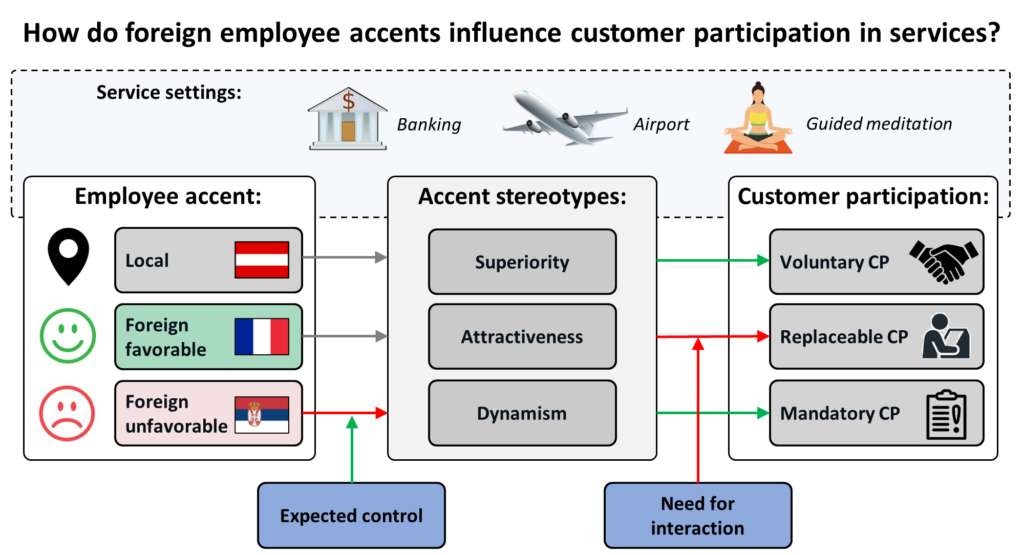Negative foreign accents evoke cultural stereotypes in customers. However, targeted personal training can increase customer satisfaction.
David Bourdin, Senior Researcher at the Department of Communication at FHWien der WKW, published the article “The Influence of Employee Accent on Customer Participation in Services” in the renowned Journal of Service Research with Christina Sichtmann from Bern University of Applied Sciences and Vasileios Davvetas from Leeds University Business School. The leading journal for service research with an impact factor of 12.4 and an “A” rating in the VHB ranking, ranks 3rd out of 226 journals in the category “Organizational Behavior and HR Management” in the current Scopus CiteScore ranking.
The article uses 4 studies (with 1,027 Austrian participants) to address the question of which attitudinal and behavioral reactions foreign accents of immigrant service employees trigger in customers and, in particular, whether and how cultural stereotypes triggered by non-native accents affect customers’ willingness to actively engage in the service process. The contexts were examined in both fictional and real services and in different industries (bank, airline, guided meditation).
Customer participation increases satisfaction
With the globalization-driven increase in immigrant service and retail employees, intercultural service encounters have become an everyday phenomenon. In these interactions, customers often use the linguistic accent of service employees as a basis for drawing conclusions about their ethnic background, which can give rise to negative or positive cultural stereotypes. It has been entirely unexplored to date how accent-based stereotyping of staff affects customer participation, that is, the extent to which customers are involved in the service process by contributing effort, knowledge, information, and other (including physical) resources to the creation and delivery of the service.
Customers are increasingly being asked to take more responsibility for service creation and delivery, even though this requires profound technical knowledge and the tasks required are characterized by high complexity. Nevertheless, organizations have recognized that encouraging customers to become “co-producers” of the service can lead to increased customer satisfaction and loyalty. Against this background, an understanding is needed of whether, why, how, and under what conditions foreign accents of employees influence customer participation and consequently improve or impair the relationship between customers and service providers.
Negativity bias prevails
The findings of David Bourdin and his colleagues show that:
- customers are less willing to participate in the service process if their counterpart has a negatively charged foreign accent (compared to a local accent),
- the negative effects of unfavorable accents (e.g. Slavic) on voluntary customer participation are stronger than the positive effects of popular accents (e.g. French), i.e. there is an asymmetric “negativity bias”,
- accent-based stereotypes based on the perceptual dimensions of superiority, attractiveness, and dynamism play a mediating role in the effect of accents on customer participation,
- unfavorable accents of employees even mitigate obligatory customer participation but increase substitutable customer participation (tasks that can be done either by customers or employees, such as the check-in for a flight) an
- mute the effects of emphasizing customer participation for customers with a high need for interpersonal interactions and can also be neutralized by offering self-service alternatives if they provide a high level of perceived control over the service experience.
Implications for staff training
These results support business leaders in terms of staffing and training. Deep-rooted cultural stereotypes shaped by host society and/or customers’ personal experiences play a far more important role than whether service workers speak with a particular accent. Although HR professionals cannot directly counteract these biases, organizations should keep in mind that counterproductive behavior by customers is more likely to be due to their perception than to an accent. Often, customers use employee accent as a surrogate explanation for problems associated with company processes per se or their own emotions and expectations. Because of the social and legal implications (e.g., discrimination), companies should internalize this distinction when making personnel decisions. Against discriminatory policies based on cultural and linguistic grounds, service providers are advised to consider inclusive approaches, such as combining employees with stigmatized accents and employees with positive affirmative or native accents, or rotating between frontline and back-office positions (when possible), as such approaches would limit the impact of negative stereotyping in service delivery.
Language training instead of accent reduction
In addition, further training for service employees aimed at promoting speech skills is recommended. The results of the studies show that acoustic intelligibility has a significant impact on voluntary customer participation, suggesting that organizations should provide training that focuses on overall speech quality (i. e., volume, hesitation, pronunciation, and clarity of argument) – and not necessarily on reducing an accent – for both native and foreign-born employees, as language skills improve the effectiveness of communication and the intelligibility of demands made on customers. This is because accents do not necessarily affect a speaker’s intelligibility. Even immigrants who have a perfect command of the host country’s language and have lived there for many years tend to speak with an accent that is perceptible to native speakers.
However, mastery of the German language as the sole criterion for hiring staff may not be sufficient to address deficits in customer participation in intercultural service encounters. Training aimed at enhancing service delivery skills (e. g., seminars on service quality, dealing with “challenging” customers, conversational skills, and observation skills) or customer relationship management (e. g., customer orientation training) would prepare employees to overcome, or at least deal professionally with, the negative stereotypes triggered by their foreign accent. Such training would also likely increase customers’ confidence in employees’ abilities and intentions, which would generally improve the interaction between the two sides.
Self service as alternative
The results also show that high expected consumer control over the service process mitigates their negative evaluation of employees with “unfavorable” accents. Therefore, we recommend that organizations with a culturally diverse team supplement their service processes with self-service alternatives. Such interaction-minimizing options provide customers who stereotype service personnel based on their accent with an alternative path to service consumption by giving them autonomy and control over the performance of key service processes without human interaction. A potentially alarming consequence of negatively afflicted accents of service personnel, which the results also show, is apparently the existence of customers who are not even willing to perform obligatory and thus essential tasks in the service process.
Although we do not assume that this can be generalized to standardized services with generic outputs (e.g., passport renewal, eye test, playing the lottery, paying highway tolls at a vending machine), there is still a risk that some aspects of the service experience will be negatively affected if these services require interaction between employees and customers. In such cases, companies should aim for a balance between substitutable activities (i.e., those that can be performed by employees or customers) and obligatory ones (those that can only be performed by customers), e. g., by transforming some interpersonal operations into self-service processes.
In conclusion, our research shows that the negative effects of unfavorable accents decrease for customers with a high need for interaction. Although this need tends to be a stable trait, it is plausible that service systems can situationally increase customers’ need for interaction by incorporating interactive elements or eliminating impersonal service processes. With this in mind, it is advisable for service providers to give staff permission to adapt or deviate from scripts to accommodate the uniqueness of each service encounter.
>> Google Scholar profile of David Bourdin
Contact:
David Bourdin, BA MSc PhD
Senior Researcher
Publications
Phone: +43 690 40 476 074
david.bourdin@fh-wien.ac.at

